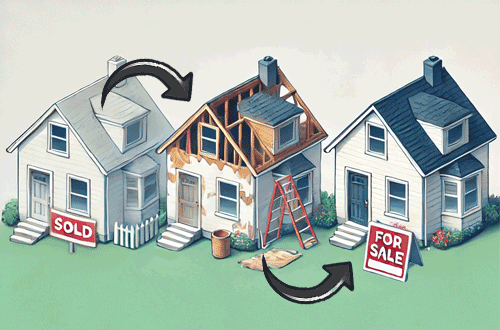The Canadian housing market is a dynamic environment, and residential flipping—buying and reselling homes for profit—has become a common practice.

To address the potential misuse of housing as an investment tool at the expense of affordability and fairness, the Canada Revenue Agency (CRA) has implemented specific rules and taxation guidelines around residential flipping. These rules aim to ensure that profits from flipping are appropriately taxed and to curb speculative practices in the real estate market.
What is Residential Flipping?
Residential flipping refers to the practice of purchasing a property with the intent to resell it for a profit in a short time frame. The CRA distinguishes flipping activities from long-term investment by evaluating the intent, frequency, and circumstances surrounding the transactions.
Examples of flipping include:
- Renovating and reselling homes for profit.
- Assigning contracts for presale condos (known as “assignment flipping”).
- Frequent buying and selling of properties without holding them for personal use or long-term rental.
CRA’s Stance on Residential Flipping
1/ Tax Treatment of Profits
Profits from flipping are fully taxable as business income, not as capital gains. This means that 100% of the profit is subject to taxation, as opposed to the more favourable capital gains rate, where only part of the gain is taxable.
2/ Principal Residence Exemption (PRE) Restrictions
The Principal Residence Exemption allows Canadians to sell their primary residence without paying tax on the gains. However, the CRA is strict about its misuse in flipping.
If the property is flipped and claimed as a principal residence without genuine use as a home, the CRA may deny the exemption and fully tax the gains as business income.
3/ Anti-Flipping Rule (2023 Onward)
Effective January 1, 2023, the CRA introduced the anti-flipping rule, automatically treating profits from the sale of residential properties owned for less than 12 months as business income.
Exceptions apply for specific life events, such as:
- Death of the owner or a related party.
- Divorce or separation.
- Loss of employment or relocation for work.
- Health-related circumstances.
If the property was held for less than a year, taxpayers must provide evidence of these exceptions to avoid being taxed as a flipper.
Key Factors the CRA Considers
The CRA evaluates several factors to determine whether a property sale constitutes flipping:
- Intention at Purchase: Was the property purchased for personal use or with the intent to sell for profit?
- Frequency of Transactions: Multiple transactions in a short time may indicate flipping.
- Renovation Activity: Significant renovations followed by a sale suggest business activity.
- Advertising and Efforts to Sell: Marketing the property indicates a commercial purpose.
- Ownership Duration: Short ownership periods signal flipping unless justified by exceptional circumstances.
Consequences of Non-Compliance
Failing to report flipping income accurately can lead to:
- Reassessment of Tax Returns: The CRA can reassess returns and apply business income rules retroactively.
- Penalties and Interest: Non-disclosure or misrepresentation may result in significant fines and interest on unpaid taxes.
- Legal Action: Persistent non-compliance can lead to criminal prosecution for tax evasion.
Conclusion
If you’re considering flipping properties or have questions about how the rules apply to you, contact Accent CPA to help you navigate the complexities and optimize your approach.
